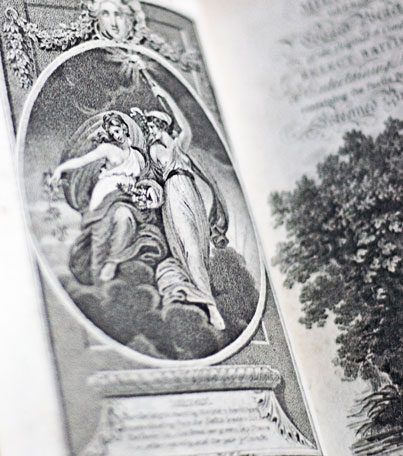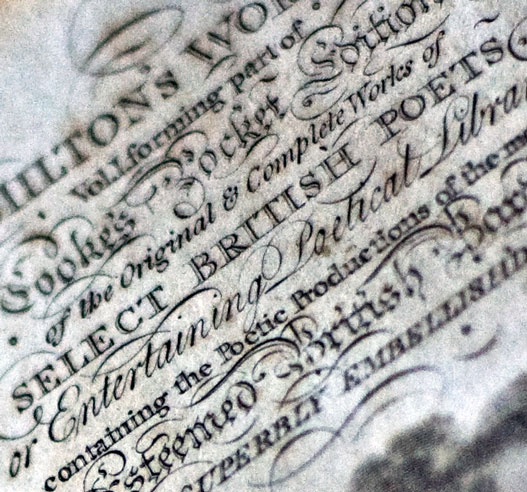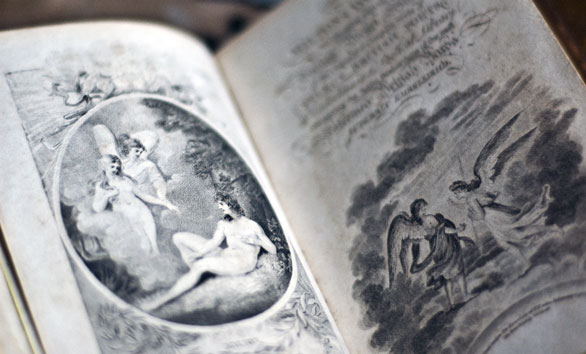Title: The Poetical Works of John Milton, from the text of Dr. Newton, with the Life of the Author and a Critique of Paradise Lost By Joseph Addfison, Embellished with Superb Engravings.
Author: John Milton, Joseph Addison (critique), Dr Newton (compiler)
ISBN: –
Publisher: C Cooke, British Poets Pocket Series, 1796
Condition: Hardcover, full brown leather. Very good for books well over 200 years old – unusually so. Rubbing to boards and spine, but spine decorations largely intact. Some mild foxing. Front hinge of first volume slightly tender, but can be safely read, not abused. All pages firmly bound and complete.
Contents:
Paradise Lost (Volume I)
Paradise Regain’d, Samson Agonistes, Comus, L’Allegro, Il Penseroso, Arcades, Lycidas, Poems, Sonnets, Psalms, Elegies, Odes, Etc. (Volume II).
Complete set
Paradise Lost
Paradise Lost is an epic poem in blank verse by the 17th-century English poet John Milton. It was originally published in 1667 in ten books, with a total of over ten thousand individual lines of verse. A second edition followed in 1674, redivided into twelve books with minor revisions throughout and a note on the versification; the majority of the poem was written while Milton was blind, and was transcribed for him.
The poem concerns the Christian story of the Fall of Man: the temptation of Adam and Eve by the fallen angel Satan and their expulsion from the Garden of Eden. Milton’s purpose, stated in Book I, is to “justify the ways of God to men” and elucidate the conflict between God’s eternal foresight and free will.
Milton incorporates Paganism, classical Greek references, and Christianity within the poem. It deals with diverse topics from marriage, politics and monarchy, and grapples with many difficult theological issues, including fate, predestination, the Trinity, and the introduction of sin and death into the world, as well as angels, fallen angels, Satan, and the war in heaven. Milton draws on his knowledge of languages, and diverse sources – primarily Genesis, much of the New Testament, the deuterocanonical Book of Enoch, and other parts of the Old Testament. Milton’s epic is generally considered one of the greatest literary works in the English language.
Paradise Regained
Paradise Regained deals with the subject of the Temptation of Christ.
The poem was composed in Milton’s cottage in Chalfont St Giles in Buckinghamshire, and was based on the Gospel of Luke’s version of the Temptation of Christ. Paradise Regained is four books in length, in contrast with Paradise Lost’s twelve.
One of the major concepts emphasized throughout Paradise Regained is the play on reversals. As implied by its title, Milton sets out to reverse the “loss” of Paradise. Thus, antonyms are often found next to each other throughout the poem, reinforcing the idea that everything that was lost in the first epic is going to be regained by the end of the mini-epic.
Additionally, this work focuses on the idea of “hunger”, both in a literal and in a spiritual sense. After wandering in the wilderness for forty days Jesus is starved of both food and the Word of God. Satan, too blind to see any non-literal meanings of the term, offers Christ food and various other temptations, but Jesus continually denies him.
Samson Agonistes
Samson Agonistes is a blank verse play by John Milton. The work is heavily indebted to Greek tragedy, but with a Biblical hero. This mix of two different cultures presents Samson as a tragic hero, who rather than raging against the Olympian deities, supplicates himself to the the one, true Christian God, whom he calls upon to save him. Samson’s blindness has led many to see him as a character with whom Milton identified with strongly (since he was blinded later in life).
Samson Agonistes plays out the final part of Samson’s life, in which he is chained in Gaza. He was tricked by his lover Delilah, his hair was shorn, and he lost his God-given strength. He is a slave and he is torn with the guilt that he betrayed God by giving up the secret he was commanded to keep close (that the source of his strength was his hair).
The play is told by a minor character–much like Greek drama, with the climax often occurred off-stage. In the final moments of the play, Samson is tied to two great columns. As Samson pulls the columns down, the mockery by the Philistines of Samson suddenly turns to panic. Samson destroys his tormentors, and himself, in one final tragic act.







